2022年中考英语二轮专题辨析系列---(10)名词正误速辨
文档属性
| 名称 | 2022年中考英语二轮专题辨析系列---(10)名词正误速辨 |
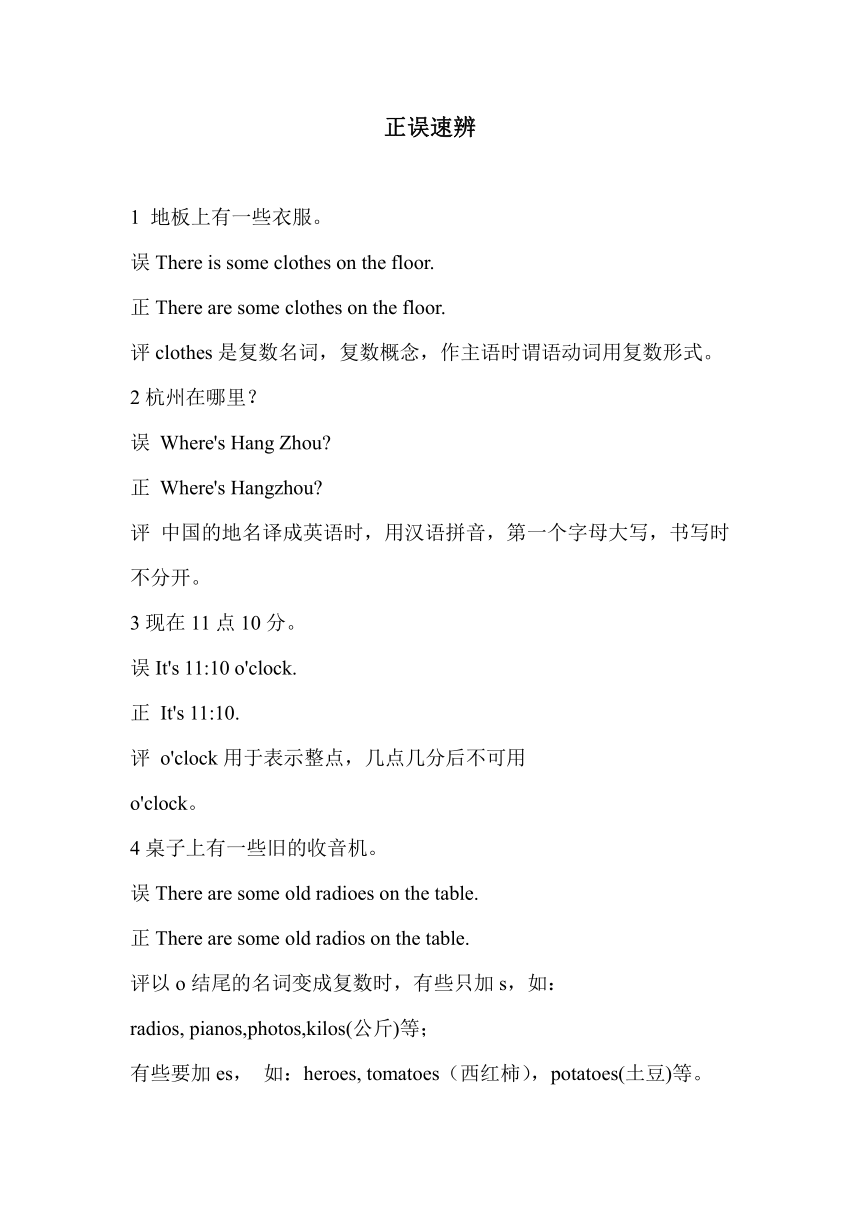
|
|
| 格式 | zip | ||
| 文件大小 | 23.5KB | ||
| 资源类型 | 教案 | ||
| 版本资源 | 人教新目标(Go for it)版 | ||
| 科目 | 英语 | ||
| 更新时间 | 2022-02-20 00:00:00 | ||
图片预览

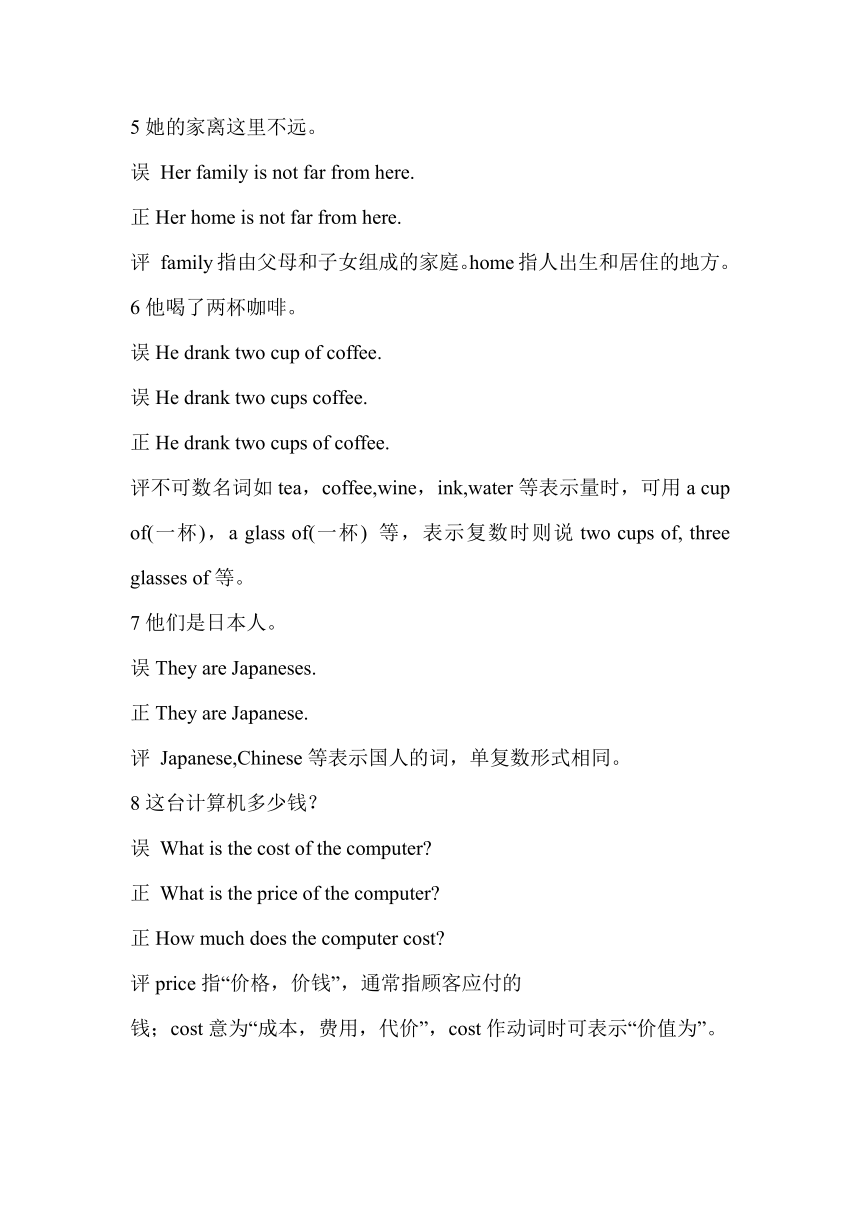
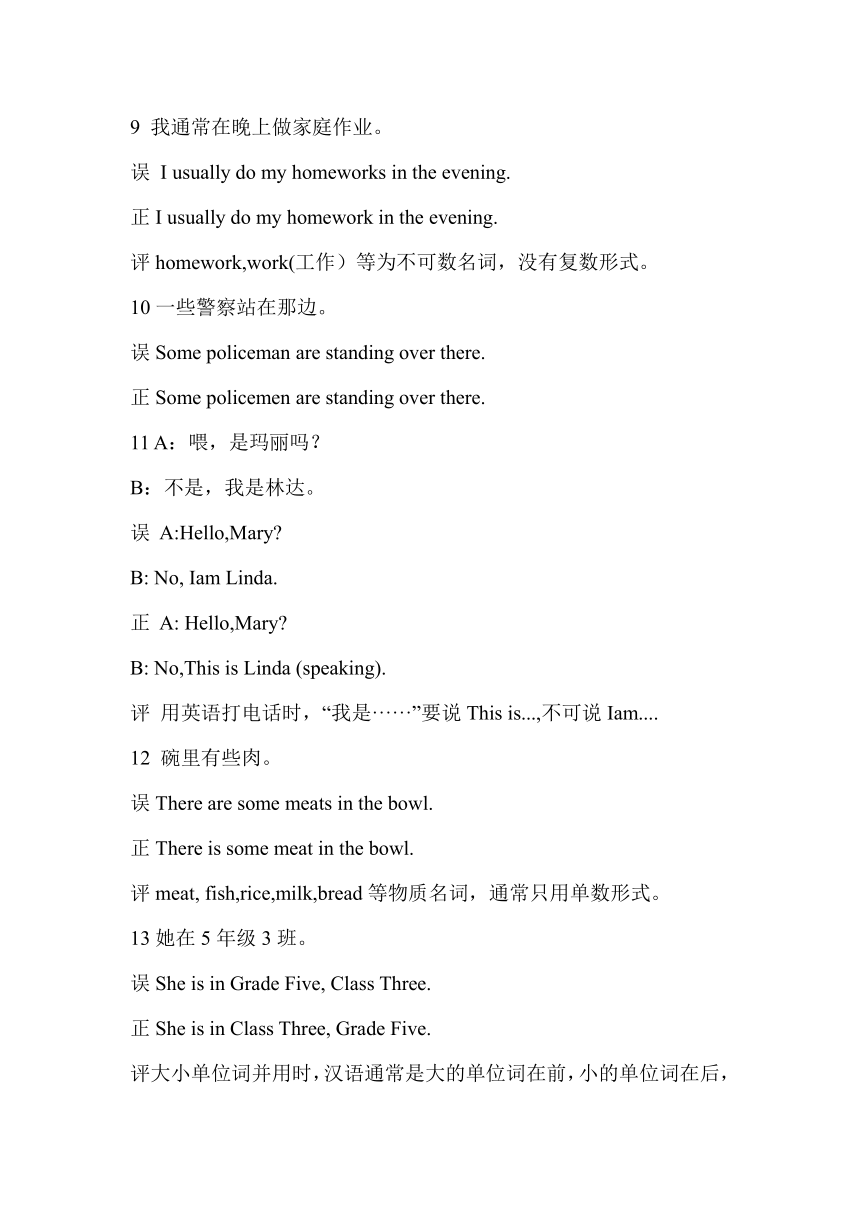
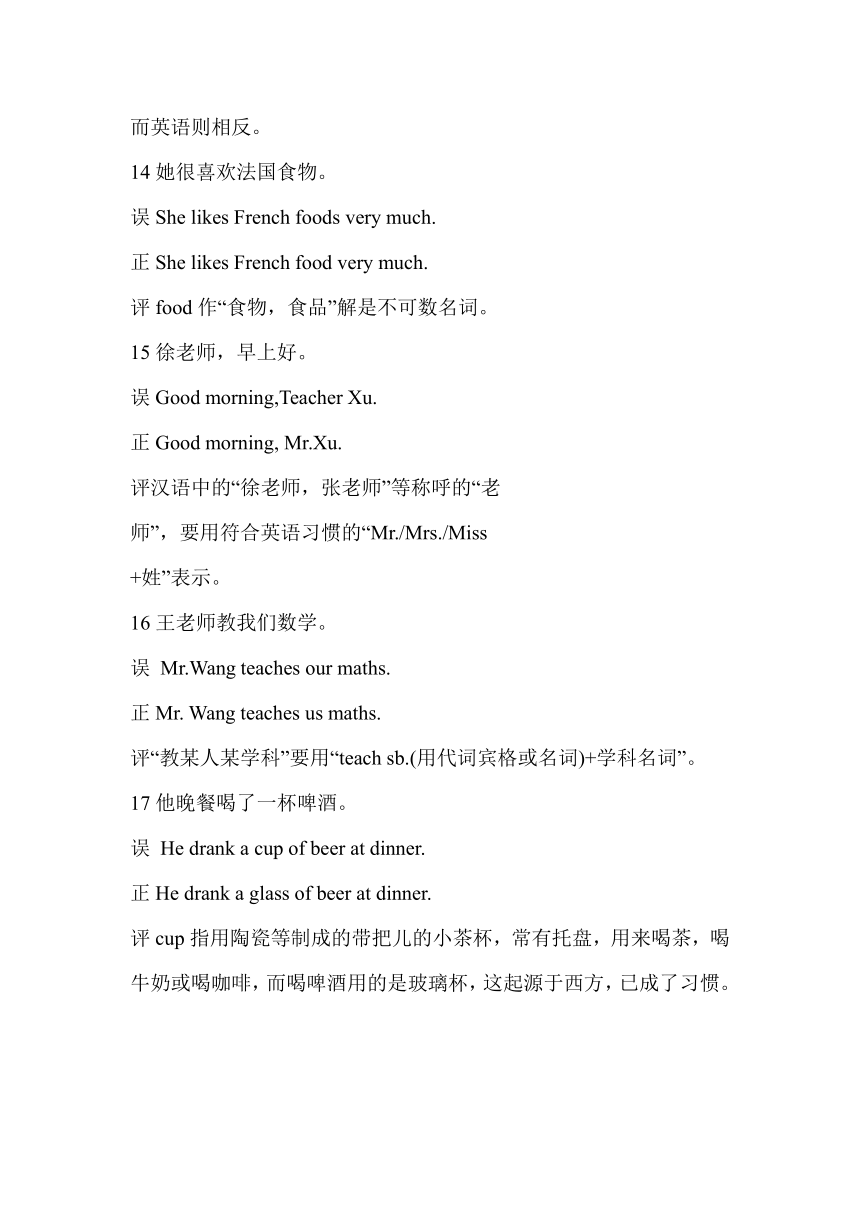
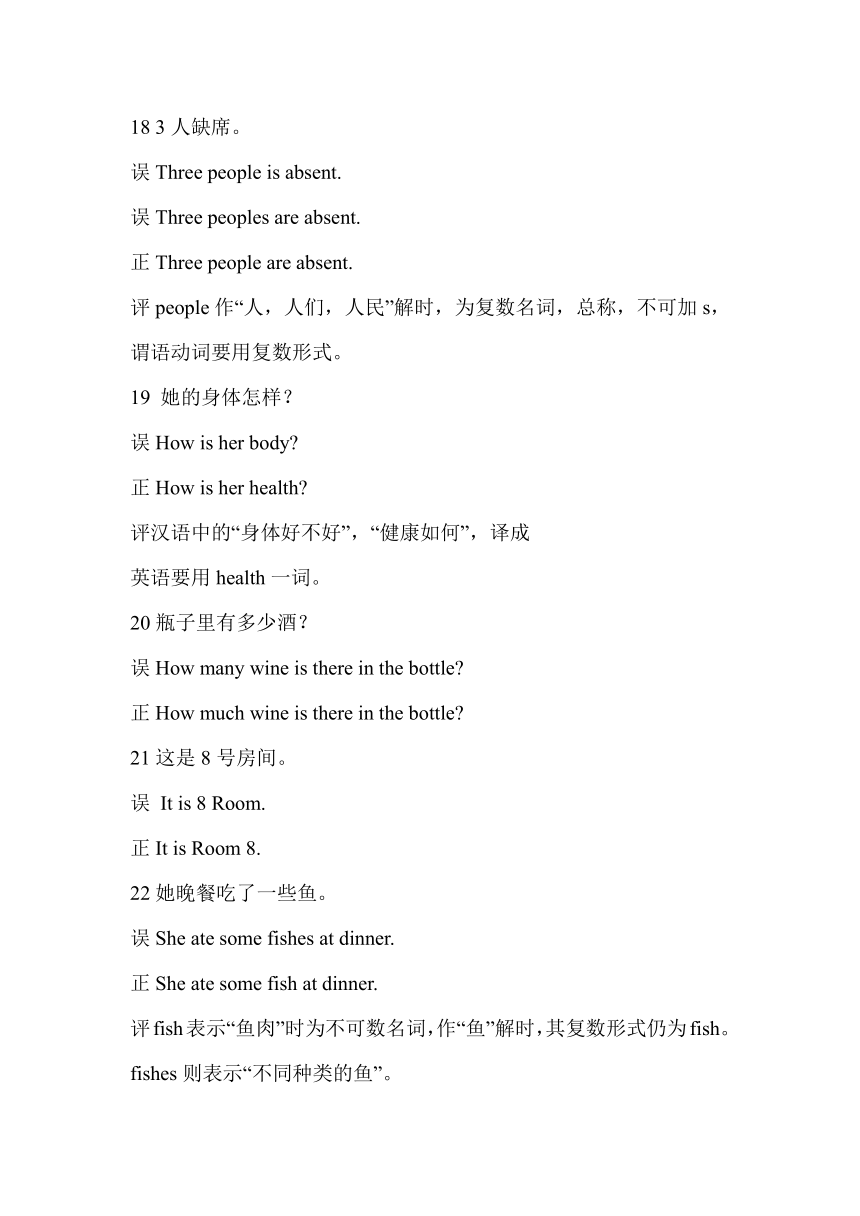
文档简介
正误速辨
1 地板上有一些衣服。
误There is some clothes on the floor.
正There are some clothes on the floor.
评clothes是复数名词,复数概念,作主语时谓语动词用复数形式。
2杭州在哪里?
误 Where's Hang Zhou
正 Where's Hangzhou
评 中国的地名译成英语时,用汉语拼音,第一个字母大写,书写时不分开。
3现在11点10分。
误It's 11:10 o'clock.
正 It's 11:10.
评 o'clock用于表示整点,几点几分后不可用
o'clock。
4桌子上有一些旧的收音机。
误There are some old radioes on the table.
正There are some old radios on the table.
评以o结尾的名词变成复数时,有些只加s,如:
radios, pianos,photos,kilos(公斤)等;
有些要加es, 如:heroes, tomatoes(西红柿),potatoes(土豆)等。
5她的家离这里不远。
误 Her family is not far from here.
正Her home is not far from here.
评 family指由父母和子女组成的家庭。home指人出生和居住的地方。
6他喝了两杯咖啡。
误He drank two cup of coffee.
误He drank two cups coffee.
正He drank two cups of coffee.
评不可数名词如tea,coffee,wine,ink,water等表示量时,可用a cup of(一杯),a glass of(一杯) 等,表示复数时则说two cups of, three glasses of等。
7他们是日本人。
误They are Japaneses.
正They are Japanese.
评 Japanese,Chinese等表示国人的词,单复数形式相同。
8这台计算机多少钱?
误 What is the cost of the computer
正 What is the price of the computer
正How much does the computer cost
评price指“价格,价钱”,通常指顾客应付的
钱;cost意为“成本,费用,代价”,cost作动词时可表示“价值为”。
9 我通常在晚上做家庭作业。
误 I usually do my homeworks in the evening.
正I usually do my homework in the evening.
评homework,work(工作)等为不可数名词,没有复数形式。
10一些警察站在那边。
误Some policeman are standing over there.
正Some policemen are standing over there.
11 A:喂,是玛丽吗?
B:不是,我是林达。
误 A:Hello,Mary
B: No, Iam Linda.
正 A: Hello,Mary
B: No,This is Linda (speaking).
评 用英语打电话时,“我是······”要说This is...,不可说Iam....
12 碗里有些肉。
误There are some meats in the bowl.
正There is some meat in the bowl.
评meat, fish,rice,milk,bread等物质名词,通常只用单数形式。
13她在5年级3班。
误She is in Grade Five, Class Three.
正She is in Class Three, Grade Five.
评大小单位词并用时,汉语通常是大的单位词在前,小的单位词在后,而英语则相反。
14她很喜欢法国食物。
误She likes French foods very much.
正She likes French food very much.
评food作“食物,食品”解是不可数名词。
15徐老师,早上好。
误Good morning,Teacher Xu.
正Good morning, Mr.Xu.
评汉语中的“徐老师,张老师”等称呼的“老
师”,要用符合英语习惯的“Mr./Mrs./Miss
+姓”表示。
16王老师教我们数学。
误 Mr.Wang teaches our maths.
正Mr. Wang teaches us maths.
评“教某人某学科”要用“teach sb.(用代词宾格或名词)+学科名词”。
17他晚餐喝了一杯啤酒。
误 He drank a cup of beer at dinner.
正He drank a glass of beer at dinner.
评cup指用陶瓷等制成的带把儿的小茶杯,常有托盘,用来喝茶,喝牛奶或喝咖啡,而喝啤酒用的是玻璃杯,这起源于西方,已成了习惯。
18 3人缺席。
误Three people is absent.
误Three peoples are absent.
正Three people are absent.
评people作“人,人们,人民”解时,为复数名词,总称,不可加s,谓语动词要用复数形式。
19 她的身体怎样?
误How is her body
正How is her health
评汉语中的“身体好不好”,“健康如何”,译成
英语要用health一词。
20瓶子里有多少酒?
误How many wine is there in the bottle
正How much wine is there in the bottle
21这是8号房间。
误 It is 8 Room.
正It is Room 8.
22她晚餐吃了一些鱼。
误She ate some fishes at dinner.
正She ate some fish at dinner.
评fish表示“鱼肉”时为不可数名词,作“鱼”解时,其复数形式仍为fish。fishes则表示“不同种类的鱼”。
23他名叫张东方。
误 His name is Zhang Dong Fang.
误His name is Zhang Dong fang.
正His name is Zhang Dongfang.
正His name is Zhang Dong-fang.
评汉语名字译成英语时,用汉语拼音来写,姓和
名要分开,但名字之间不分开,但可用连字符,
姓和名的第一个字母都要大写。
24 这本书20元钱。
误This book is twenty yuans.
正This book is twenty yuan.
评汉语的货币名称译成英语时用音译,但只用单数形式,且通常用斜体。
25 一位士兵站在街道中间。
误A soldier is standing in the centre of the street.正A soldier is standing in the middle of the street.
26这是通往那座海滨小城的路吗?
误 Is this the street to the seaside town
正Is this the road to the seaside town
评street指城市中的“街道”,两边有建筑物。
road指“公路,道路”。
27 昨天许多人去游泳了。
误A lot people went swimming yesterday.
正 A lot of/Lotsofpeople went swimming yesterday.
28他昨天买了一些纸。
误He bought some papers yesterday.正He bought some paper yesterday.
评paper表示“纸”时为不可数名词,表示“报纸,论文”时,为可数名词。
29 我要理发。
误I'll have my hairs cut.
正I'll have my hair cut.
评 hair指一个人的全部头发时是不可数名词。表示一根或几根头发,是可数名词。
30这棵大树宜于乘凉。
误This large tree makes a nice shadow.
正This large tree makes a nice shade.
评 shade指“遮阴处,(图画中的)阴影”。
shadow指“影子,阴影”。
31 校门关上了。
误 The school door is closed.
正 The school gate is closed.
32 大厅里挤满了人。
误 The hall is full of men.
正The hall is full of people.
评 泛指人时,要用people,不用men。
33 特纳一家将去山里度假。
误 Turner's family will spend their holidays in the
hills.
正 The Turners will spend their holidays in the
hills.
正 The Turner family will spend their holidays in
the hills.
评 表示“全家,一家人”时,要说“the+复数
姓”或“the+姓+family”。
34 他看到地板上有一支钢笔。
误He saw a pen on the ground.
正He saw a pen on the floor.
评floor意为室内“地板”;ground指室外“地面”。
35我们今天下午有两节课。
正We have two lessons this afternoon.正We have two classes this afternoon.
36 她昨天买了许多水果。
误She bought many fruits yesterday.正 She bought much fruit yesterday.
评 总称“水果”时,要用fruit,用alot of或
much修饰。fruits则表示不同种类的水果。
37 其他学生正在植树。
误The others students are planting trees.
正The other students are planting trees.
评other为形容词,others是名词,常同the连用,
指“别的人”。
38警察在那边站着。
误 The police is standing over there.正The police are standing over there.
评police是集体名词,总称,作主语时,谓语动词通常用复数形式。
39他步行去学校。
误 He went to school on feet.
正He went to school on foot.
评 on foot意为“步行”,为固定搭配,不可说onfeet。
40你什么时候入团的?
误When did you join the league
正When did you join the League
评 “中国共产主义青年团”的League,第一个字母要大写。
41她卖蔬菜和鸡蛋。
误She sells vegetable and eggs.
正She sells yegetables and eggs.
评 vegetable是可数名词,常用复数形式。
42 她在三班。
误 She is in class three.
正She is in Class Three.
评英语中,表示号码编排的名词和基数词,每个词的第一个字母通常都要大写。
43 那边有六头牛。
误There are six cattles over there.正There are six cattle over there.
44今天星期几?
误 What's the date today
正What day is it today
评What's the date today 意为“今天几号?”
45她有两块手表。
误She has two watchs.
正She has two watches.
46 迈克,有你的电话。
误 Mike,you have a telephone.
正 Mike, there is a telephone call for you.
47她所有的牙都掉了。
误All her tooth are gone.
正All her teeth are gone.
48天气多糟啊!
误What a bad weather it is!
正 What bad weather it is!
评 weather是不可数名词,前面不可加a。
49他是英国人。
误 He is an English.
正He is an Englishman.
评 English作名词时,从整体上表示“英语,英
国人”。
50那座小城位于中国的东北部。
误The town lies in the eastnorth of China.正The town lies in the northeast of China.评复合方位词,英语的表述方式与汉语不同。
51他们是男教师。
误They are man teachers.
正They are men teachers.
评man和woman作定语时,要同被修饰的名词在数上保持一致。
52街上车辆很多。
误There are a lot of traffics in the street.正There are a lot of traffic in the street.
评traffic意为“交通,交通量,往来”,为不可数名词。
53你最好多锻炼身体。
误 You'd better take more exercises.
正 You'd better take more exercise.
评exercise作“训练、体育锻炼”解时,为不可
数名词;作“练习,习题”解时,是可数名词。54他的一个同学考试没及格。
误 One of his classmate failed in the exam.
正One of his classmates failed in the exam.
55他们住在3-8号房间。
误They live in Rooms No.3-8.
正 They live in Rooms Nos.3-8.
评 No.为number的缩写式,如果号码不止一个,要用Nos..
562班在河边植树。
误 Class Two is planting trees along the river.
正Class Two are planting trees along the river.
评class如果表示班上的各个成员,作主语时,谓语动词要用复数。
57他昨天买了一件家具。
误He bought a furniture yesterday.
正He bought a piece of furniture yesterday.
评 furniture是不可数名词,如表示数量,可用piece。
58画中有3只狼。
误There are three wolfs in the picture.
正There are three wolves in the picture.
评以f或fe结尾的名词变为复数时,要将f或fe改为v,再加es。
59地板上有1支粉笔。
误There is a chalk on the floor.
正There is a piece of chalk on the floor.
评chalk为物质名词,不可数,要用piece表示数量。
60他早餐吃了两块面包。
误 He had two breads for breakfast.
正He had two pieces of bread for breakfast.
评 bread是不可数名词,可用piece,slice或loaf表示数量。
61他们将建一个新的运动场。
误They will build a new sport field.
正They will build a new sports field.
62 山坡上有一些羊。
误There are some sheeps on the hillside.
正There are some sheep on the hillside.
63 请吃点水果。
误Please help yourself to some fruits.
正 Please help yourself to some fruit.
64 他父亲在第一中学教数学。
误 His father teaches maths at First Middle
School.
误 His father teaches maths at 1 Middle School.
正 His father teaches maths at the No.1 Middle School.
正His father teaches maths at the Middle School No.1.
正His father teaches maths at the First Middle School.
65 他将在5月中旬回家。
误He will be back home in the centre of May.
正He will be back home in the middle of May.
评 表示“时间上的‘中间’”,只能用middle,不
可用centre。
66请勿踏草地。
误Please keep off the grasses.
正Please keep off the grass.
评grass表示“草地,牧场”时,为不可数名词。
67她的眼镜在桌子上。
误Her glass is on the table.
正Her glasses are on the table.
评表示“眼镜”要用glasses,glass表示“玻璃”,
a glass表示“一只玻璃杯”。
68所有这些学生都取得了很大进步。
误 All these students have made great progresses.
正All these students have made great progress.
评progress表示“进步,发展”时,为不可数名词。
69100美元买这本词典太贵了。
误 One hundred dollars are too dear for the
dictionary.
正 One hundred dollars is too dear for the
dictionary.
评英语中,表示“数量,距离,金额、时间”等的复数名词,通常看作一个整体,作主语时谓语动词要用单数。
70这些士兵在那场战斗中丢了命。
误These soldiers lost their life in the battle.
正These soldiers lost their lives in the battle.
评 生命的复数形式要用lves,表示多人
71我通常在晚上读点东西。
误I usually do some readings in the evening.
正I usually do some reading in the evening.
评 有一些习惯说法,如:do some reading(读点东西), do some shopping (买些东西),do thecooking(做饭)等,动名词用单数形式。
72她告诉他一条好消息。
误She told him a good news.
正She told him a piece of good news.
评news是不可数名词,前面不可用a/an修饰,表示数量时,要用piece。
73那个房间有双层窗。
误That room has double window.
正That room has double windows.
评double后接复数名词,而a double后接单数名词。
74她同莉莉交上了朋友。
误 She made friend with Lily.
正She made friends with Lily.
评 make friends with意为“与····交朋友,与……友好”,为习惯用法。
75 他们是德国人吗?
误Are they Germen
正Are they Germans
评German(德国人)一词虽以man结尾,但属于规则变化,要加s变为复数形式,比较不规则
变 化: Frenchman Frenchmen,
Englishman→Englishmen。
76他身上没有零钱。
误 He has no changes on him.
正He has no change on him.
uns表示“零钱,找头”时,为不可数名
77他的绘画知识很丰富。
误 He has a lot of knowledges of painting.
正 He has a lot of knowledge of painting.
评 knowledge意为“知识,学问,知道”,为不可数名词,可用much,alot of,little和alittle修饰。
78那不是我的铅笔,那是我妹妹的。
误 That isn't my pencil. That's my sister.
正That isn't my pencil. That's my sister's.
评装人的”要用名同所有格表示,应在名词后
79这副手套是他的。
误This pair of gloves are his.
正This pair of gloves is his.
评“a/this/that pair of+复数名词”作主语时,谓语动词要用单数形式。
80他房间的门是红色的。
误 His room's door is red.
正The door of his room is red.
评表示无生命的所属关系,通常要用of所有格,不用名词所有格。
81他懂一点儿法语。
误 He knows a bit French.
正He knows a bit of French.
正He knows a little French.
评 abit表示“一点,少许”时,用作副词,修饰形容词或副词。abit of和alittle可直接修饰名词。
82我喜欢绿色。
误I like green colour.
正 I like green.
评green作名词时表示“绿色”,不可再加colour。
83这些是女衬衫。
误These are womens' shirts.
正These are women's shirts.
评不规则名词women,men,policemen是复数形式,所有格要加's。
84他们通常吃一顿丰盛的午餐。
误 They usually have good lunch.
正They usually have a good lunch.
评三餐名词breakfast,lunch和supper通常不加冠词,但有形容词修饰时,则要加不定冠词a/an。
1 地板上有一些衣服。
误There is some clothes on the floor.
正There are some clothes on the floor.
评clothes是复数名词,复数概念,作主语时谓语动词用复数形式。
2杭州在哪里?
误 Where's Hang Zhou
正 Where's Hangzhou
评 中国的地名译成英语时,用汉语拼音,第一个字母大写,书写时不分开。
3现在11点10分。
误It's 11:10 o'clock.
正 It's 11:10.
评 o'clock用于表示整点,几点几分后不可用
o'clock。
4桌子上有一些旧的收音机。
误There are some old radioes on the table.
正There are some old radios on the table.
评以o结尾的名词变成复数时,有些只加s,如:
radios, pianos,photos,kilos(公斤)等;
有些要加es, 如:heroes, tomatoes(西红柿),potatoes(土豆)等。
5她的家离这里不远。
误 Her family is not far from here.
正Her home is not far from here.
评 family指由父母和子女组成的家庭。home指人出生和居住的地方。
6他喝了两杯咖啡。
误He drank two cup of coffee.
误He drank two cups coffee.
正He drank two cups of coffee.
评不可数名词如tea,coffee,wine,ink,water等表示量时,可用a cup of(一杯),a glass of(一杯) 等,表示复数时则说two cups of, three glasses of等。
7他们是日本人。
误They are Japaneses.
正They are Japanese.
评 Japanese,Chinese等表示国人的词,单复数形式相同。
8这台计算机多少钱?
误 What is the cost of the computer
正 What is the price of the computer
正How much does the computer cost
评price指“价格,价钱”,通常指顾客应付的
钱;cost意为“成本,费用,代价”,cost作动词时可表示“价值为”。
9 我通常在晚上做家庭作业。
误 I usually do my homeworks in the evening.
正I usually do my homework in the evening.
评homework,work(工作)等为不可数名词,没有复数形式。
10一些警察站在那边。
误Some policeman are standing over there.
正Some policemen are standing over there.
11 A:喂,是玛丽吗?
B:不是,我是林达。
误 A:Hello,Mary
B: No, Iam Linda.
正 A: Hello,Mary
B: No,This is Linda (speaking).
评 用英语打电话时,“我是······”要说This is...,不可说Iam....
12 碗里有些肉。
误There are some meats in the bowl.
正There is some meat in the bowl.
评meat, fish,rice,milk,bread等物质名词,通常只用单数形式。
13她在5年级3班。
误She is in Grade Five, Class Three.
正She is in Class Three, Grade Five.
评大小单位词并用时,汉语通常是大的单位词在前,小的单位词在后,而英语则相反。
14她很喜欢法国食物。
误She likes French foods very much.
正She likes French food very much.
评food作“食物,食品”解是不可数名词。
15徐老师,早上好。
误Good morning,Teacher Xu.
正Good morning, Mr.Xu.
评汉语中的“徐老师,张老师”等称呼的“老
师”,要用符合英语习惯的“Mr./Mrs./Miss
+姓”表示。
16王老师教我们数学。
误 Mr.Wang teaches our maths.
正Mr. Wang teaches us maths.
评“教某人某学科”要用“teach sb.(用代词宾格或名词)+学科名词”。
17他晚餐喝了一杯啤酒。
误 He drank a cup of beer at dinner.
正He drank a glass of beer at dinner.
评cup指用陶瓷等制成的带把儿的小茶杯,常有托盘,用来喝茶,喝牛奶或喝咖啡,而喝啤酒用的是玻璃杯,这起源于西方,已成了习惯。
18 3人缺席。
误Three people is absent.
误Three peoples are absent.
正Three people are absent.
评people作“人,人们,人民”解时,为复数名词,总称,不可加s,谓语动词要用复数形式。
19 她的身体怎样?
误How is her body
正How is her health
评汉语中的“身体好不好”,“健康如何”,译成
英语要用health一词。
20瓶子里有多少酒?
误How many wine is there in the bottle
正How much wine is there in the bottle
21这是8号房间。
误 It is 8 Room.
正It is Room 8.
22她晚餐吃了一些鱼。
误She ate some fishes at dinner.
正She ate some fish at dinner.
评fish表示“鱼肉”时为不可数名词,作“鱼”解时,其复数形式仍为fish。fishes则表示“不同种类的鱼”。
23他名叫张东方。
误 His name is Zhang Dong Fang.
误His name is Zhang Dong fang.
正His name is Zhang Dongfang.
正His name is Zhang Dong-fang.
评汉语名字译成英语时,用汉语拼音来写,姓和
名要分开,但名字之间不分开,但可用连字符,
姓和名的第一个字母都要大写。
24 这本书20元钱。
误This book is twenty yuans.
正This book is twenty yuan.
评汉语的货币名称译成英语时用音译,但只用单数形式,且通常用斜体。
25 一位士兵站在街道中间。
误A soldier is standing in the centre of the street.正A soldier is standing in the middle of the street.
26这是通往那座海滨小城的路吗?
误 Is this the street to the seaside town
正Is this the road to the seaside town
评street指城市中的“街道”,两边有建筑物。
road指“公路,道路”。
27 昨天许多人去游泳了。
误A lot people went swimming yesterday.
正 A lot of/Lotsofpeople went swimming yesterday.
28他昨天买了一些纸。
误He bought some papers yesterday.正He bought some paper yesterday.
评paper表示“纸”时为不可数名词,表示“报纸,论文”时,为可数名词。
29 我要理发。
误I'll have my hairs cut.
正I'll have my hair cut.
评 hair指一个人的全部头发时是不可数名词。表示一根或几根头发,是可数名词。
30这棵大树宜于乘凉。
误This large tree makes a nice shadow.
正This large tree makes a nice shade.
评 shade指“遮阴处,(图画中的)阴影”。
shadow指“影子,阴影”。
31 校门关上了。
误 The school door is closed.
正 The school gate is closed.
32 大厅里挤满了人。
误 The hall is full of men.
正The hall is full of people.
评 泛指人时,要用people,不用men。
33 特纳一家将去山里度假。
误 Turner's family will spend their holidays in the
hills.
正 The Turners will spend their holidays in the
hills.
正 The Turner family will spend their holidays in
the hills.
评 表示“全家,一家人”时,要说“the+复数
姓”或“the+姓+family”。
34 他看到地板上有一支钢笔。
误He saw a pen on the ground.
正He saw a pen on the floor.
评floor意为室内“地板”;ground指室外“地面”。
35我们今天下午有两节课。
正We have two lessons this afternoon.正We have two classes this afternoon.
36 她昨天买了许多水果。
误She bought many fruits yesterday.正 She bought much fruit yesterday.
评 总称“水果”时,要用fruit,用alot of或
much修饰。fruits则表示不同种类的水果。
37 其他学生正在植树。
误The others students are planting trees.
正The other students are planting trees.
评other为形容词,others是名词,常同the连用,
指“别的人”。
38警察在那边站着。
误 The police is standing over there.正The police are standing over there.
评police是集体名词,总称,作主语时,谓语动词通常用复数形式。
39他步行去学校。
误 He went to school on feet.
正He went to school on foot.
评 on foot意为“步行”,为固定搭配,不可说onfeet。
40你什么时候入团的?
误When did you join the league
正When did you join the League
评 “中国共产主义青年团”的League,第一个字母要大写。
41她卖蔬菜和鸡蛋。
误She sells vegetable and eggs.
正She sells yegetables and eggs.
评 vegetable是可数名词,常用复数形式。
42 她在三班。
误 She is in class three.
正She is in Class Three.
评英语中,表示号码编排的名词和基数词,每个词的第一个字母通常都要大写。
43 那边有六头牛。
误There are six cattles over there.正There are six cattle over there.
44今天星期几?
误 What's the date today
正What day is it today
评What's the date today 意为“今天几号?”
45她有两块手表。
误She has two watchs.
正She has two watches.
46 迈克,有你的电话。
误 Mike,you have a telephone.
正 Mike, there is a telephone call for you.
47她所有的牙都掉了。
误All her tooth are gone.
正All her teeth are gone.
48天气多糟啊!
误What a bad weather it is!
正 What bad weather it is!
评 weather是不可数名词,前面不可加a。
49他是英国人。
误 He is an English.
正He is an Englishman.
评 English作名词时,从整体上表示“英语,英
国人”。
50那座小城位于中国的东北部。
误The town lies in the eastnorth of China.正The town lies in the northeast of China.评复合方位词,英语的表述方式与汉语不同。
51他们是男教师。
误They are man teachers.
正They are men teachers.
评man和woman作定语时,要同被修饰的名词在数上保持一致。
52街上车辆很多。
误There are a lot of traffics in the street.正There are a lot of traffic in the street.
评traffic意为“交通,交通量,往来”,为不可数名词。
53你最好多锻炼身体。
误 You'd better take more exercises.
正 You'd better take more exercise.
评exercise作“训练、体育锻炼”解时,为不可
数名词;作“练习,习题”解时,是可数名词。54他的一个同学考试没及格。
误 One of his classmate failed in the exam.
正One of his classmates failed in the exam.
55他们住在3-8号房间。
误They live in Rooms No.3-8.
正 They live in Rooms Nos.3-8.
评 No.为number的缩写式,如果号码不止一个,要用Nos..
562班在河边植树。
误 Class Two is planting trees along the river.
正Class Two are planting trees along the river.
评class如果表示班上的各个成员,作主语时,谓语动词要用复数。
57他昨天买了一件家具。
误He bought a furniture yesterday.
正He bought a piece of furniture yesterday.
评 furniture是不可数名词,如表示数量,可用piece。
58画中有3只狼。
误There are three wolfs in the picture.
正There are three wolves in the picture.
评以f或fe结尾的名词变为复数时,要将f或fe改为v,再加es。
59地板上有1支粉笔。
误There is a chalk on the floor.
正There is a piece of chalk on the floor.
评chalk为物质名词,不可数,要用piece表示数量。
60他早餐吃了两块面包。
误 He had two breads for breakfast.
正He had two pieces of bread for breakfast.
评 bread是不可数名词,可用piece,slice或loaf表示数量。
61他们将建一个新的运动场。
误They will build a new sport field.
正They will build a new sports field.
62 山坡上有一些羊。
误There are some sheeps on the hillside.
正There are some sheep on the hillside.
63 请吃点水果。
误Please help yourself to some fruits.
正 Please help yourself to some fruit.
64 他父亲在第一中学教数学。
误 His father teaches maths at First Middle
School.
误 His father teaches maths at 1 Middle School.
正 His father teaches maths at the No.1 Middle School.
正His father teaches maths at the Middle School No.1.
正His father teaches maths at the First Middle School.
65 他将在5月中旬回家。
误He will be back home in the centre of May.
正He will be back home in the middle of May.
评 表示“时间上的‘中间’”,只能用middle,不
可用centre。
66请勿踏草地。
误Please keep off the grasses.
正Please keep off the grass.
评grass表示“草地,牧场”时,为不可数名词。
67她的眼镜在桌子上。
误Her glass is on the table.
正Her glasses are on the table.
评表示“眼镜”要用glasses,glass表示“玻璃”,
a glass表示“一只玻璃杯”。
68所有这些学生都取得了很大进步。
误 All these students have made great progresses.
正All these students have made great progress.
评progress表示“进步,发展”时,为不可数名词。
69100美元买这本词典太贵了。
误 One hundred dollars are too dear for the
dictionary.
正 One hundred dollars is too dear for the
dictionary.
评英语中,表示“数量,距离,金额、时间”等的复数名词,通常看作一个整体,作主语时谓语动词要用单数。
70这些士兵在那场战斗中丢了命。
误These soldiers lost their life in the battle.
正These soldiers lost their lives in the battle.
评 生命的复数形式要用lves,表示多人
71我通常在晚上读点东西。
误I usually do some readings in the evening.
正I usually do some reading in the evening.
评 有一些习惯说法,如:do some reading(读点东西), do some shopping (买些东西),do thecooking(做饭)等,动名词用单数形式。
72她告诉他一条好消息。
误She told him a good news.
正She told him a piece of good news.
评news是不可数名词,前面不可用a/an修饰,表示数量时,要用piece。
73那个房间有双层窗。
误That room has double window.
正That room has double windows.
评double后接复数名词,而a double后接单数名词。
74她同莉莉交上了朋友。
误 She made friend with Lily.
正She made friends with Lily.
评 make friends with意为“与····交朋友,与……友好”,为习惯用法。
75 他们是德国人吗?
误Are they Germen
正Are they Germans
评German(德国人)一词虽以man结尾,但属于规则变化,要加s变为复数形式,比较不规则
变 化: Frenchman Frenchmen,
Englishman→Englishmen。
76他身上没有零钱。
误 He has no changes on him.
正He has no change on him.
uns表示“零钱,找头”时,为不可数名
77他的绘画知识很丰富。
误 He has a lot of knowledges of painting.
正 He has a lot of knowledge of painting.
评 knowledge意为“知识,学问,知道”,为不可数名词,可用much,alot of,little和alittle修饰。
78那不是我的铅笔,那是我妹妹的。
误 That isn't my pencil. That's my sister.
正That isn't my pencil. That's my sister's.
评装人的”要用名同所有格表示,应在名词后
79这副手套是他的。
误This pair of gloves are his.
正This pair of gloves is his.
评“a/this/that pair of+复数名词”作主语时,谓语动词要用单数形式。
80他房间的门是红色的。
误 His room's door is red.
正The door of his room is red.
评表示无生命的所属关系,通常要用of所有格,不用名词所有格。
81他懂一点儿法语。
误 He knows a bit French.
正He knows a bit of French.
正He knows a little French.
评 abit表示“一点,少许”时,用作副词,修饰形容词或副词。abit of和alittle可直接修饰名词。
82我喜欢绿色。
误I like green colour.
正 I like green.
评green作名词时表示“绿色”,不可再加colour。
83这些是女衬衫。
误These are womens' shirts.
正These are women's shirts.
评不规则名词women,men,policemen是复数形式,所有格要加's。
84他们通常吃一顿丰盛的午餐。
误 They usually have good lunch.
正They usually have a good lunch.
评三餐名词breakfast,lunch和supper通常不加冠词,但有形容词修饰时,则要加不定冠词a/an。
同课章节目录
- 词法
- 名词
- 动词和动词短语
- 动词语态
- 动词时态
- 助动词和情态动词
- 非谓语动词
- 冠词
- 代词
- 数词和量词
- 形容词副词及其比较等级
- 介词和介词短语
- 连词和感叹词
- 构词法
- 相似、相近词比较
- 句法
- 陈述句
- 一般疑问句和否定疑问句
- 特殊疑问句及选择疑问句
- 反意疑问句
- 存在句(There be句型)
- 宾语从句
- 定语从句
- 状语从句
- 主谓一致问题
- 简单句
- 并列句
- 复合句
- 主谓一致
- 主、表语从句
- 名词性从句
- 直接引语和间接引语
- 虚拟语气
- 感叹句
- 强调句
- 倒装句
- 祈使句
- 句子的成分
- 句子的分类
- 题型专区
- 单项选择部分
- 易错题
- 完形填空
- 阅读理解
- 词汇练习
- 听说训练
- 句型转换
- 补全对话
- 短文改错
- 翻译
- 书面表达
- 任务型阅读
- 语法填空
- 其他资料
